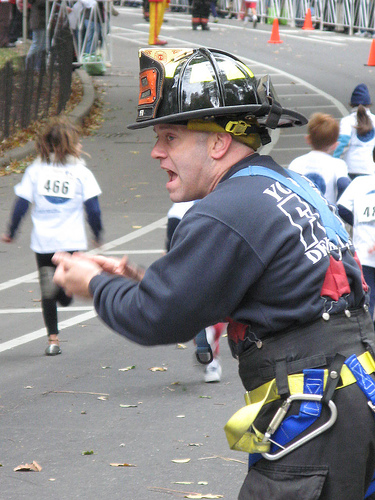
With fellow Blue Wave students after earning our black stripes (last rank before black belt), October 2009
After flirting with consistent exercise for two decades, in 2005 I took advantage of being in Florida to finally start running regularly. That experience, which I talked about in a
Audio clip: Adobe Flash Player (version 9 or above) is required to play this audio clip. Download the latest version here. You also need to have JavaScript enabled in your browser.
for Jacksonville, Florida NPR affiliate WJCT, completely changed my understanding of exercise. It turned out that the very beginning of exercise, getting into the groove, was much harder than continuing–and that far from being unrelenting torture, regular exercise could actually be enjoyable.
I ought to have recognized this already: after all, soccer had been fun in grade school, ultimate frisbee entertained me during college, and I’d enjoyed fencing classes in my twenties. But neither running nor any of these other activities prepared me for what would happen when I took on a new kind of exercise in late 2006. For me, getting involved in Taekwondo was to running as April in Paris is to June in Cincinnati.
Martial arts as a family sport
A little background: I studied Uechi Ryu karate for about a year at college and had enjoyed it enough that for years I had it in the back of my head that I’d eventually want to pursue martial arts again. By 2006, my son had gotten old enough that we were looking for a program for him as well. I had assumed we’d study karate, in different classes, but when my son was invited to a friend’s birthday party at Blue Wave Taekwondo in Burlington, Vermont (the town where we lived), it was immediately obvious that this was the place for us to try. For one thing, they taught classes that parents and kids could attend together, a possibility I hadn’t even thought of. For another thing, my son’s friend’s family couldn’t say enough about how friendly, well-organized, and instructive the school was. To top this off, the school was (and still is) run by Master Gordon White, a personable sixth-dan black belt who had fought on the U.S. National Taekwondo team and won medals in international competition.
I’m not suggesting Taekwondo is every person’s ideal exercise. It’s social, very energetic, rigorous, formal, demanding, and a little rough. My older sister loves spinning and rollerblading; my younger sister loves dancing; and my father prefers canoeing, kayaking, and cross-country skiing. So I’m not so much suggesting you run out and start taking Taekwondo (although it’s not a bad idea for a lot of people), but that if you don’t yet love the kind of exercise you’re doing, there’s a good chance you just haven’t found the right kind of exercise yet.
Why Taekwondo works for me
Taekwondo offers some unusual benefits that fit my needs well. I like the people I spend time with at the dojang (Taekwondo gym), which helps. Taekwondo as practiced at Blue Wave is rigorous interval training (probably the best general kind of exercise for weight loss), and it builds muscle as well as providing a lot of aerobic exercise.
Some of the greatest benefits for me, though, are mental instead of physical: the need to always improve my fundamentals (kicks, strikes, blocks, stances, and so on) exercises parts of my brain that I suspect would otherwise be neglected. And while we’re in class I’m usually so engrossed at trying to master whatever we’re working on that the time flies by. As I talk about in my post on getting into a state of flow, some of the basic elements we need to become engrossed and driven in what we’re doing are challenge, specific goals, and constant feedback. All of these elements are available when a good instructor is teaching a complex physical skill, like martial arts, dancing, or fencing. Not everyone will connect with those activities in the ways that are needed to establish flow, but the opportunity is there.
To put the same thing more simply: Taekwondo keeps me so interested, I don’t greatly care how much work I’m doing to practice it.
Why Blue Wave works for me
Not all martial arts–or all Taekwondo schools–are created equal. Different martial arts offer different advantages, such as the directed force of Aikido; the intense focus of karate; the powerful physical grappling of judo; or the flow and speed of kung fu. Different martial arts will attract different kinds of people, although it’s important to understand that different martial arts also provide different kinds of workouts: for instance, not all martial arts are very helpful for weight loss.
Blue Wave teaches forms and fundamentals as well as Olympic Style sparring, which is a very energetic, physically demanding type of contest between fighters wearing padded safety gear. Olympic Style sparring is fairly safe and is practiced in tournaments from the local to the international level, including, of course, at the Olympics. To the best of my knowledge (understanding that my experience is limited), no other martial art offers such a well-defined and safety-conscious sport of sparring.
So Olympic Style Taekwondo sparring for me is as much a sport as a martial art, which gives more direction to my training and provides more ways to enjoy Taekwondo. But many Taekwondo schools don’t teach Olympic Style sparring, or they focus on other elements of Taekwondo, or they practice a type of Taekwondo that is not based on rigorous traditional practices. None of these kinds of schools would work nearly as well for me as Blue Wave would, although Blue Wave is far from unique: there are many excellent Taekwondo programs around the country and the world.
I could go on about what I like about Blue Wave, but if I’ve done what I intended, I’ve shown at least one example of finding a kind of exercise that really fits the person doing it, enough to provide a glimpse of what April in Paris looks like. Here’s hoping you’re already there, or if not, that April comes soon.
Photo by 2nd dan Blue Wave black belt Sandra Pavlo
Like this:
Like Loading...









 The 9 Truths About Weight Loss
The 9 Truths About Weight Loss

